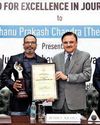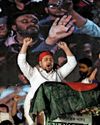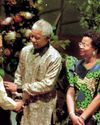
Elections are necessary in democracies, because the core strength of democracy lies in participatory politics. Today, Jammu and Kashmir is preparing to hold its first assembly elections in a decade, in a strategic-sociopolitical environment that underwent a radical transformation after the abrogation of Article 370 on August 5, 2019.
The big question now: how can political parties help make the elections free and fair, ensuring that voters overcome challenges rooted in historical reasons that had pitted a sizeable section of the population against the Indian state?
The polls will define what a vote for democracy means in Jammu and Kashmir today. In the past five years, there has been a sharp swing in the rhetoric of political parties in Jammu and Kashmir— from a vocal unwillingness to fight the polls unless Article 370 was restored, to demands for statehood and, finally, expressing willingness to participate in the polls. Some politicians even concede that boycotting the district development council polls in 2020 was a mistake.
This demonstrates two points. First, the Indian state matters. Second, the political class—including the BJP, the Congress, the National Conference and the Peoples’ Democratic Party—understands that for the common man bijli, sadak, paani (electricity, road, water) matter. Hospitals, schools and colleges matter. Roads and infrastructure matter. Employment matters.
Politicians, as most Kashmiris would agree, have not historically done well when it comes to meeting their expectations. Hence, the apprehension among voters about whether the upcoming polls would bring much-needed relief in their day-to-day lives or just be a vehicle for vote bank politics that would skirt around issues of development and governance.
This story is from the September 01, 2024 edition of THE WEEK India.
Start your 7-day Magzter GOLD free trial to access thousands of curated premium stories, and 9,000+ magazines and newspapers.
Already a subscriber ? Sign In
This story is from the September 01, 2024 edition of THE WEEK India.
Start your 7-day Magzter GOLD free trial to access thousands of curated premium stories, and 9,000+ magazines and newspapers.
Already a subscriber? Sign In

The war and the winner
THE WEEK’s Bhanu Prakash Chandra bags the prestigious IPI award for his coverage of the Russia-Ukraine war from the frontlines

India Fashion Week is 25
India Fashion Week is now 25 years old. Never mind all the brand names that came before the term 'India Fashion Week'—some have stayed, many have gone. The important thing is that season after season, in two cities at times, with two or three warring sponsors at times, India Fashion Week held its head above the water and sustained.

Kalki, out of the box
I love the fact that Kalki Koechlin, one of our most versatile actors, does not fit into a box.

Vote's the plan
Student protesters have launched a political party, but can the country move beyond its binary political landscape?

Learners shall inherit the roads
I used to love driving in Delhi! The broad smooth roads, with well-laid out footpaths and cycle tracks, made every drive a glorious experience. As the years passed, I graduated from a Lambretta scooter to a Fiat 1100 to a Maruti 800, then quickly to a Zen and several years later to a Swift Dzire, till I reached my current Maruti Ciaz. The roads of Delhi, meanwhile, deteriorated from being the smooth cheeks of you-know-who of Bollywood to the smallpox-pitted face of that character actor of the same celluloid vintage.

AN AFFAIR TO REMEMBER
The public dressing-down of Zelensky at the White House is a timely reminder that India should zealously protect its strategic autonomy in external affairs

Every structure we build is a reflection of our commitment to innovation and quality
My journey in real estate has been nothing short of transformative. I hold an MBA in Finance, which has given me a strategic understanding of business, investments, and market dynamics.

India's Coal Miner CCL Nurtures Green Growth
Central Coalfields Limited (CCL), is in the forefront of India's coal mining sector driving technological innovation, and community development for contributing to India's long-term energy security while aiming for global sustainability goals. By fostering a resilient coal mining industry, the company's strategic roadmap focuses on enhancing resource efficiency, reduce its carbon footprint, and transform the mining sector for empowering India's clean energy practices and initiatives. A responsible miner, the Category-I Mini-Ratna PSU, touched a record high of 86 million tonnes of coal production during 2023-24.

Breaking Barriers
The Unstoppable Rise of Indian Women

EMPOWERING GENERATIONS: The Remarkable Journey of Dr. Reshma Kaur
Every institution, whether in education or business, thrives under the guidance of visionary leadership.
